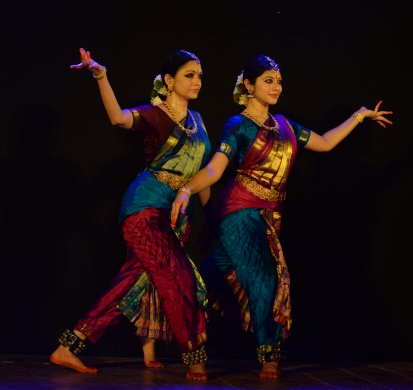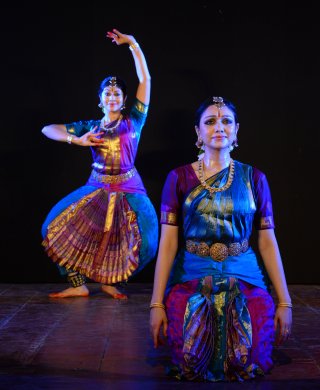
|   |

|   |
Dwita: Duality of life - Vaishnavi B.M. e-mail: vaishu19kash@gmail.com January 25, 2016 “The notes are my breath, the rhythm, my pulse and my body and mind, the divine instruments that transcend me to a state of being one with the Universe and the Universe in me!” is the silent utterance of Bharatanatyam. To celebrate this communication of silence in the midst of transcendental music and the most genuine of bhavas, there gathered patrons of art at Don Bosco Hall, Mangalore to witness DWITA organized by Gaana Nritya Academy and Nrityaangan, of Mangalore instrumental in the promotion of Bharatanatyam in Dakshina Kannada region. With the conceptualization of different perceptions pertaining to any subject and their harmonious co-existence, DWITA meaning duality, was the theme of the event rendered by Rama Vaidyanathan and her daughter Dakshina Vaidyanathan.  If wealth is the heart of the materialistic world, knowledge is the heart of the spiritual world. And life is balanced only with the co-existence of the two. And it was only befitting to invoke the blessings of Saraswati, the Goddess of knowledge, and Lakshmi, the Goddess of wealth which was the basis of pushpanjali for the evening which was set in Rasikapriya ragam and tisra triputa talam and alarippu in talam Sankeernam. The music composers are Vidya Srinivasan and K. Venkateshwaran with rhythm composition by Ramamoorthy Sringanesh. The highest form of surrender is to give one’s entirety to a person which can happen only in the purity of true love. Based around this idea, the varnam composed by the Tanjavur Quartet depicted the emotions of passion and devotion of the nayika to become one with Lord Shiva, both on physical and metaphysical levels. To render a spiritual touch to the subtle intricacies of the composition was probably one of the most beautiful renditions ever witnessed and was set in ragam Bhairavi and talam Rupakam, with jathis composed by K. Shiva Kumar.  While the mother is the giver of life, the breath to a soul, the father is the protector of dharma and the destroyer of adharma. A man and a woman have complementary roles. They are different, but they are one! This was depicted with the idea of Ardhanareeshwara where Shiva and Parvathi are the two halves of the same body, indicating that they are inseparable, like a word and its meaning. A rendition by Dakshina, this was an absorbing performance set to ragam Megh and adi talam with the music composer being O.S. Arun. Having seen life, a part of her own self come to existence, open her eyes, lay her first step, finally become a woman, one like herself, a daughter is the most precious one for any mother. However, like the sandalwood which must be separated from the mountains to spread its fragrance to the world, like the pearl which must be brought out from the ocean to adorn in the world with its lustre, like the musical notes that need to be released from the strings of a veena by strumming them, a mother must send away her daughter from her protective shell to spread her radiance in the world. The depiction of this blissful idea was transcended to a different zone as the roles played by the performers in that very relationship in reality, and the depth that this aspect added to the performance was admirable. The music was in Ragamalika and adi talam, a composition of Dr. S. Vasudevan. Man is mortal. Yet, he is a manifestation of the eternal. This final rendition based on Skanda Purana elegantly brought out this philosophy of realizing the eternal in a mortal, the infinite in finite. The music was set in ragam Charukesi and adi talam and composed by G.S. Rajan. And with this concluding performance, it is not wrong to say that the event left the audience see the power in those legs, wisdom in those eyes, the depth in those thoughts and true sense of expertise, introspection and meaning in the entire event. The artistes were ably supported by outstanding musicians Dr. S. Vasudevan and K. Venkateswaran on vocal and nattuvangam, Ramamoorthy Sriganesh on mridangam and Rajat Prasanna on flute. Vaishnavi B.M. is a connoisseur of Indian classical arts and a SPICMACAY volunteer in Mangalore. |